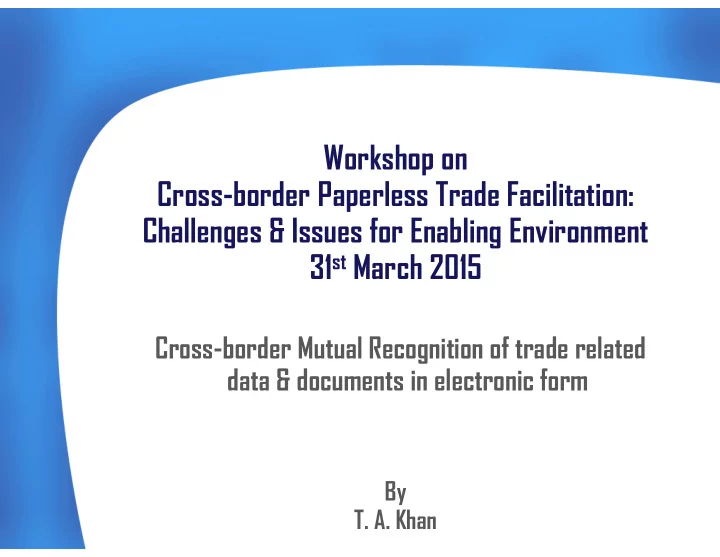

Workshop on Cross-border Paperless Trade Facilitation: Challenges & Issues for Enabling Environment 31 st March 2015 Cross-border Mutual Recognition of trade related data & documents in electronic form By T. A. Khan
Mutual recognition The parties shall provide for mutual recognition of trade- related data and documents in electronic form originating from other parties on the basis of substantially equivalent level of reliability
Securing electronic transactions AUTHENTICATION : Reliable identification of sender/recipient of data CONFIDENTIALITY : Protection of data from undesired disclosure INTEGRITY : Prevention of undesired creation, modification or deletion of data NON-REPUDIATION: Committed transactions cannot be denied
Impact of UNCITRAL Texts � Model Law on e-Commerce : Provides for equal treatment of paper- based and electronic information, technological neutrality and functional equivalence.The Indian Information Technology Act,2000 is largely based on this Model Law. � Model Law on Electronic Signatures : Technology neutrality('electronic' signatures) , trust-worthiness criteria , recognition of foreign certificates and e-signatures. The Indian Information Technology (Amendment) Act, 2008 and Regulations for Recognition of Foreign CAs are influenced by this Text.
Indian PKI Model CCA Directory of Directory of Certificates Certificates CA CA CA CRLs CRLs Relying Subscriber Subscriber Subscriber Party CCA regulates, licenses CAs and operates Root Certifying Authority for India
PKI in India : A Brief Overview � The Information Technology Act , 2000 provides legal sanctity to Digital Signatures. � Office of Controller of Certifying Authorities(CCA) has been established for licensing and regulating the work of Certifying Authorities � Office of CCA has established the Root Certifying Authority of India(RCAI) for signing certificates of licensed CAs, who issue DSCs to the subscribers or operate sub-CAs for issuing DSCs to subscribers � Areas of Applications : e-Licencing , e-Procurement , e-Banking e- Governance, e-Mail Signing and Encryption, etc.
Electronic Signatures Indian IT Act is technology-neutral and can cover signatures based on various, however such technologies and the manner in which thtechnologiesey are to be used is to be prescribed by the Central Governmen Foreign Certificates CCA can also recognize Foreign Certifying Authorities operating under a PKI Regulator,if:- • The level of reliability of PKI environment of the country is at least equal that of India. • The Controller (CCA) enters into a MoU with the PKI Regulator for Mutual Recognition of CAs. • The Controller ,with previous approval of the Central Government, publishes the list of recognised CAs and the CA is included in such list. Foreign CAs not operating under a PKI Regulator need to apply to the CCA for recognition
Legally valid proof of existence of a document at a particular time User submits hash of the document,TSA adds a Timestamp and signs it Privacy is maintained as only hash of the document is made available to TSA(CA)
Biometric Authentication for DSC issuance About Aadhaar: Unique Identification Numbers allotted to residents. Biometrics (fingerprints, iris scan) captured along with demographic details. Biometrics based de-duplication. Supports Biometric and OTP based identity authentication . Facilitating DSC issuance through Aadhaar Current process : Applicant approaches a Registration Authority(RA) with DSC application form and supporting documents(copies need to be attested by authorities like Gazetted Officers of the Government, Bank Managers ,etc.). The process increases reliability of authentication but it also causes some inconveniences (attesting authorities may not be so easily available.) Alternate way : Aadhaar based Biometric authentication of the applicant. Pilot run of the above Aadhaar based DSC issuance process in being carried out by 3 Indian CAs.
Way Forward • Enabling domestic legal environment for electronic authentication/electronic signature in a member state • Enabling domestic legal environment mutual recognition • MOU among member states for mutual recognition • UNESCAP resolution 68/3 and 70/6 will facilitate this process
Thank You !!! Questions ?
Recommend
More recommend